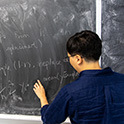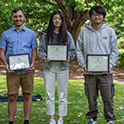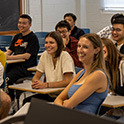
Faculty collaboration
Our tenured and tenure-track faculty participate in millions of dollars in collaborative research with USC and other universities. That means more research opportunities for undergraduates and graduate students.
The statistics department excels at collaborative research between faculty, partner institutions and our students at all levels. Our scholars bring limitless creativity to the field, with applied statistics in areas including biology, medicine and environmental science.

In the Department of Statistics at USC, research is one of our foremost priorities. We conduct statistical research at the cutting-edge of the field, emphasizing data analysis, emerging technologies and new applications.
Statistics intersects with almost every aspect of life and can be applied in any field, from biomedical applications to athletics, machine learning and artificial intelligence to the inner workings of the human mind. Statistics helps you make the most of data and analyze it in new, creative ways. We are passionate about pushing the field of statistics further, with research on novel statistical methodologies and approaches to analysis.
We also prioritize excellence in teaching, and research presents an opportunity to teach and mentor our students through hands-on experience. Our students make meaningful contributions to the work, bringing new ideas to the table. Many have published their scholarship and gone on to successful careers as researchers.

Our tenured and tenure-track faculty participate in millions of dollars in collaborative research with USC and other universities. That means more research opportunities for undergraduates and graduate students.

Doctoral students in the Department of Statistics receive funding to attend conferences to connect with peers and present their work. We champion our graduate students through mentorship and support before and after graduation.

Statistics students at all levels can contribute to research at USC. Opportunities may be available as early as your first year. The Magellan Scholar program provides funding and mentorship for undergraduate student research.
From applied statistical methods to pure research, our faculty represents diverse areas of expertise and scholarship. With our focus on collaboration and mentorship, students are welcome to contact faculty members whose interests match their own.
Xiaoyan (Iris) Lin (Ph.D., Statistics, University of Missouri)
Developing advanced statistical methods for censored and/or ordinal data and Bayesian Additive Regression Trees (BART) for arbitrary censored survival data.
Joshua Tebbs (Ph.D., Statistics, North Carolina State University)
Developing statistical methods for categorical data and their application in infectious disease testing and general biostatistical methods.
Dewei Wang (Ph.D., Mathematical Sciences, Clemson University)
Pooled biomonitoring, group testing, order-restricted inference, nonparametric/semiparametric regression, shrinkage methods and quantile regression.
Yen-Yi Ho (Ph.D., Biostatistics, Johns Hopkins University, 2000)
Developing statistical methods and algorithms for analyzing genetic data generated by high-throughput technologies and gene pathway/network enrichment analysis. Joint appointment in Biological Sciences.
Joshua Tebbs (Ph.D., Statistics, North Carolina State University)
Developing statistical methods for categorical data and their application in infectious disease testing, and general biostatistical methods.
Dewei Wang (Ph.D., Mathematical Sciences, Clemson University)
Pooled biomonitoring, group testing, order-restricted inference, nonparametric/semiparametric regression, shrinkage methods and quantile regression.
David Hitchcock (Ph.D., Statistics, University of Florida)
Functional data analysis and cluster analysis, recently focusing on environmental
data analysis. Application areas include spatio-temporal precipitation and flooding
data, medical skill data, and controlled fire and fuel data.
Yuexuan Wu (Ph.D., Statistics, Florida State University)
Developing novel statistical and machine-learning methodologies for analyzing high-dimensional and complex data stemming from neuroimaging, neuroscience and broader biological and medical research.
Ting Fung Ma (Ph.D., Statistics, University of Wisconsin–Madison)
Spatial, spatiotemporal and environmental statistics as well as developing methodologies for data with dependence and big volume with theoretical soundness and computational scalability.
Shanghong Xie (Ph.D., Statistics, Columbia University)
Machine learning, network analysis, precision medicine, functional data analysis, causal inference, mediation analysis with neuroimaging and genetic biomarkers and variable selection.
Xianzheng Huang (Ph.D., Statistics, North Carolina State University)
Developing inferential methods that account for measurement errors in data and methodologies for drawing inferences based on non-Gaussian data, including heavy-tailed data, directional data and compositional data.
Joshua Tebbs (Ph.D., Statistics, North Carolina State University)
Developing statistical methods for categorical data and their application in infectious disease testing and general biostatistical methods.
Brian Habing (Ph.D., Statistics, University of Illinois at Urbana-Champagne)
Psychometrics and scale construction, with a particular emphasis on the theory and applications of multidimensional item response theory, as well as statistics education.
Karl Gregory (Ph.D., Statistics, Texas A&M University)
Bootstrap methods for inference in high-dimensional regression and on nonparametric regression.
Yen-Yi Ho (Ph.D., Biostatistics, Johns Hopkins University, 2000)
Developing statistical methods and algorithms for analyzing genetic data generated by high-throughput technologies and gene pathway/network enrichment analysis. Joint appointment in Biological Sciences.
Ting Fung Ma (Ph.D., Statistics, University of Wisconsin–Madison)
Spatial, spatiotemporal and environmental statistics as well as developing methodologies for data with dependence and big volume with theoretical soundness and computational scalability.
William Consagra (Ph.D., Statistics, University of Rochester)
Functional data analysis, deep learning, imaging and computational neuroscience.
Yuexuan Wu (Ph.D., Statistics, Florida State University)
Developing novel statistical and machine-learning methodologies for analyzing high-dimensional and complex data stemming from neuroimaging, neuroscience and broader biological and medical research.
Yuexuan Wu (Ph.D., Statistics, Florida State University)
Developing novel statistical and machine-learning methodologies for analyzing high-dimensional and complex data stemming from neuroimaging, neuroscience and broader biological and medical research.
Xiaoyan (Iris) Lin (Ph.D., Statistics, University of Missouri)
Bayesian statistics, with applications in survival analysis and medical diagnostic accuracy and ROC analysis.
Edsel Peña (Ph.D., Statistics, Florida State University)
Mathematical statistics, survival analysis, reliability, stochastic processes, biostatistics, financial statistics, high-dimensional inference and foundational issues in statistics.
Lianming Wang (Ph.D., Statistics, University of Missouri)
Survival analysis, longitudinal data analysis, Bayesian computing and statistical applications.
Joshua Tebbs (Ph.D., Statistics, North Carolina State University)
Developing statistical methods for categorical data and their application in infectious disease testing and general biostatistical methods.